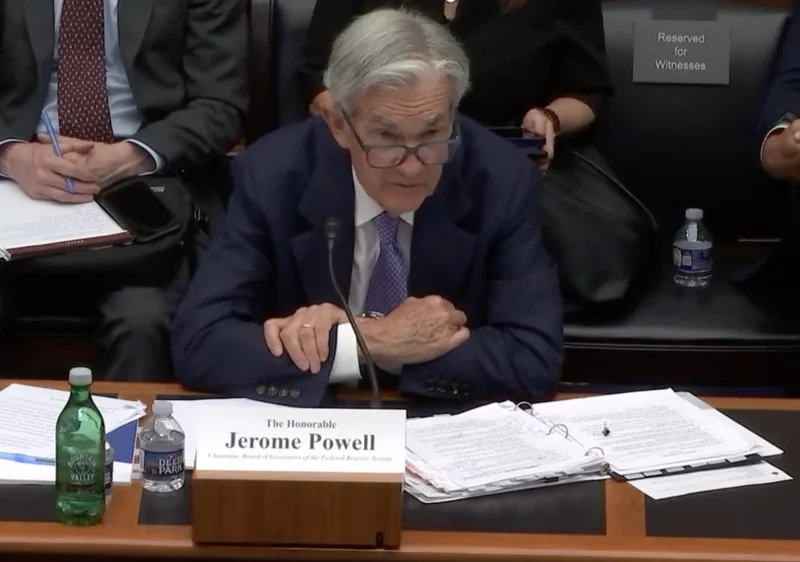Federal Reserve Chairman Jerome Powell told Congress on Tuesday that economic data merited lower interest rates but that tariffs could undo the central bank’s fight to tame inflation.
“If you just look in the rearview mirror and look at the existing data that we’ve seen, you can make a good argument that that would call for us to be at a neutral level, which would be, maybe, a couple of cuts or maybe more,” Powell said. “The reason we’re not is the forecast. All professional forecasters on the outside and in the Fed do expect a meaningful increase in inflation over the course of this year.”
Under pressure from President Donald Trump to lower interest rates, Powell tried to avoid the political fray as he faced questions from Democrats and Republicans at a House Financial Services Committee hearing.
“If it turns out that inflation pressures do remain contained, we will get to a place where we cut rates sooner rather than later, but I wouldn’t want to point to a particular meeting,” Powell said.
Trump told Congress before the hearing got underway to put pressure on Powell.
“‘Too Late’ Jerome Powell, of the Fed, will be in Congress today in order to explain, among other things, why he is refusing to lower the Rate,” Trump wrote in a social media post. “Europe has had 10 cuts, we have had ZERO. No inflation, great economy – We should be at least two to three points lower.”
Trump said the central bank should take action before it costs taxpayers.
“Would save the USA 800 Billion Dollars Per Year, plus,” the president said. “What a difference this would make. If things later change to the negative, increase the Rate. I hope Congress really works this very dumb, hardheaded person, over. We will be paying for his incompetence for many years to come.”
U.S. Rep. French Hill, chairman of the committee, asked Powell why he raised concerns this year about tariffs, but didn’t speak out in 2021 when Democrats sought to sharply increase federal spending through the $1.9 trillion American Rescue Plan.
“In February of 2021, you told us in this committee that you would stay in your lane and not comment on President Biden’s proposal for the American rescue plan,” Hill, R-Ark., said. “But here in this year, you have commented on this idea of tariffs being sent by the executive branch. Are tariffs in your lane but huge fiscal spending by the Biden administration not in your lane?”
Powell said he had not commented on tariffs.
“We haven’t commented and it would be inappropriate to comment on the policy of tariffs,” Powell said. “We don’t have a view, it’s not our job and we just wouldn’t do that – just as we wouldn’t comment on the reconciliation package that you’re working on now.”
He continued: “We’re not commenting on tariffs, what our job is is inflation, keeping inflation under control and also keeping maximum employment. And when policies have what appear to be short and medium-term meaningful implications for that, then the inflation, not the policies, becomes our job.”
Powell also said there was more than one way forward.
“Many paths are possible here,” he said.
Committee members from both parties hit Powell with questions on everything from tariffs, to the proposed ceasefire in the Middle East and what could be done to make homeownership more accessible.
Most financial forecasts take a dim view of Trump’s efforts to reorder the global economy through tariffs, which are taxes on imports paid by the company importing the products. The company can absorb the taxes or try to pass them on to consumers through higher prices.
Earlier this month, the World Bank cut its annual economic growth forecast, saying Trump’s tariffs posed a “significant headwind” for nearly all economies. The bank slashed its forecast for 2025 by 0.4 percentage points to 2.3%.
In April, the International Monetary Fund projected global growth would reach 2.8% this year and 3% next year, a cumulative downgrade of about 0.8 percentage points relative to the IMF’s January update.
“Beyond the abrupt increase in tariffs, the surge in policy uncertainty is a major driver of the economic outlook,” Pierre‑Olivier Gourinchas, IMF’s chief economist, said at the time. “If sustained, the increasing trade tensions and uncertainty will slow global growth significantly.”
Powell delivered a similar assessment this spring.
“The level of the tariff increases announced so far is significantly larger than anticipated,” Powell said in prepared remarks at the Economic Club of Chicago in April. “The same is likely to be true of the economic effects, which will include higher inflation and slower growth.”
Economists, businesses and some publicly traded companies have warned that tariffs could raise prices on a wide range of consumer products.
Trump has said he wants to use tariffs to restore manufacturing jobs lost to lower-wage countries in decades past, shift the tax burden away from U.S. families, and pay down the national debt.






